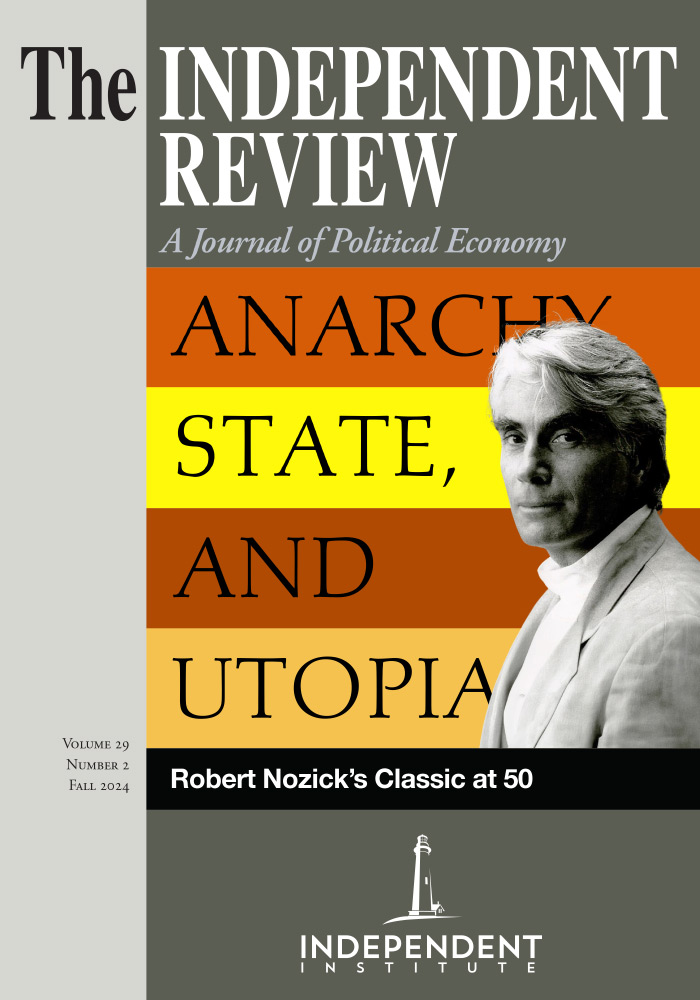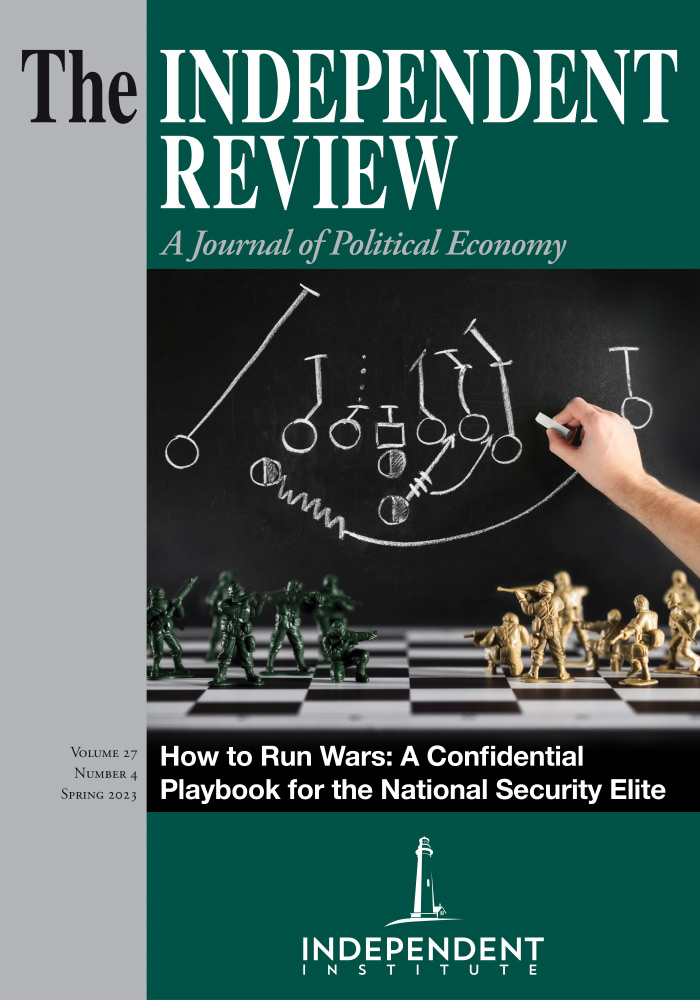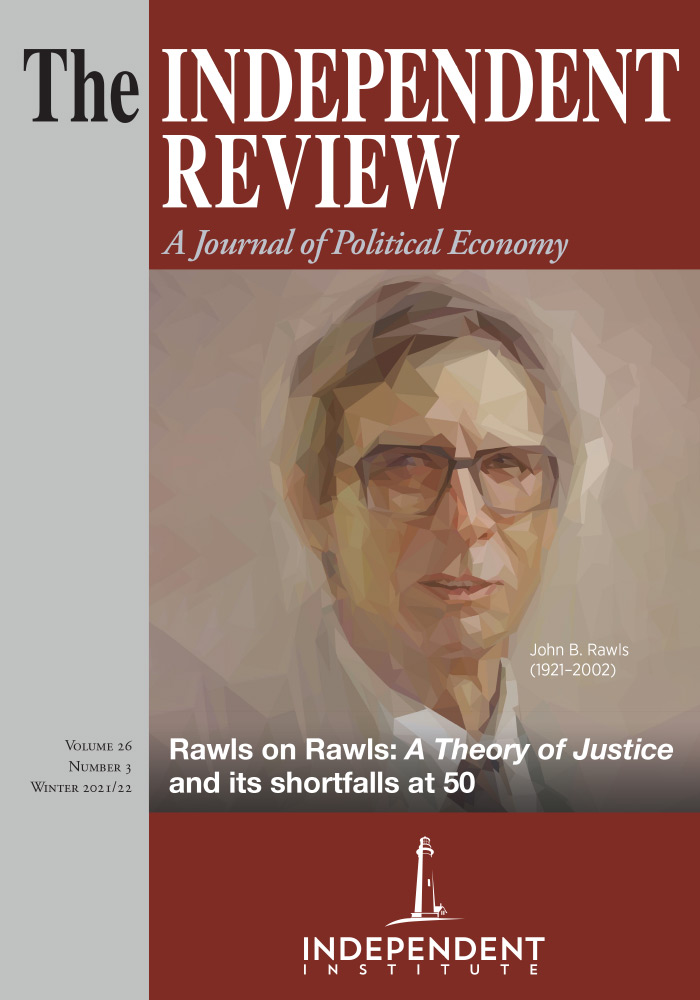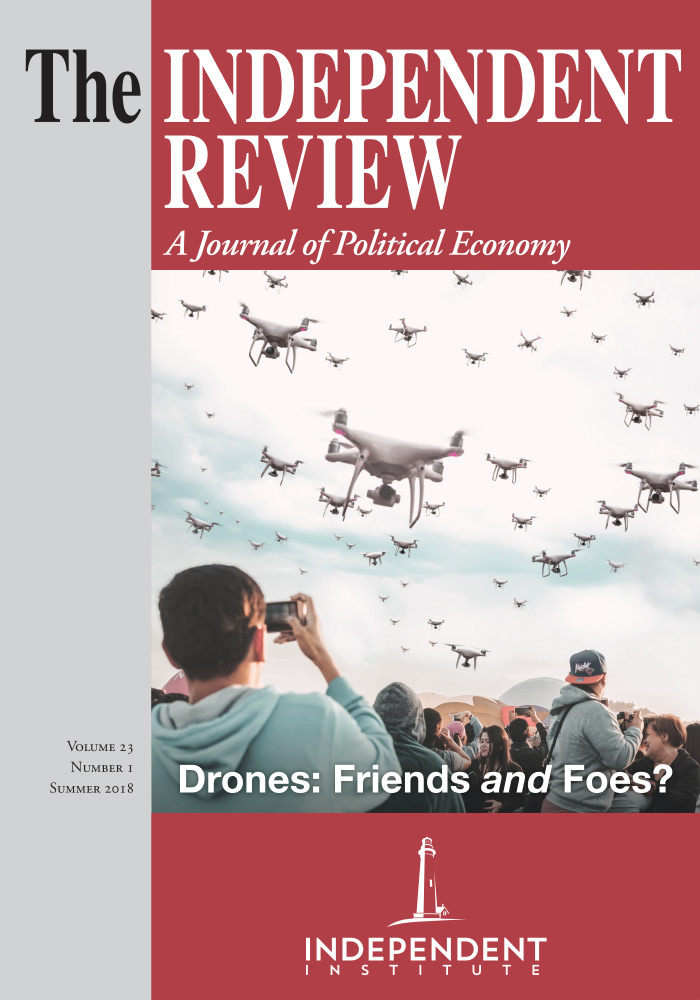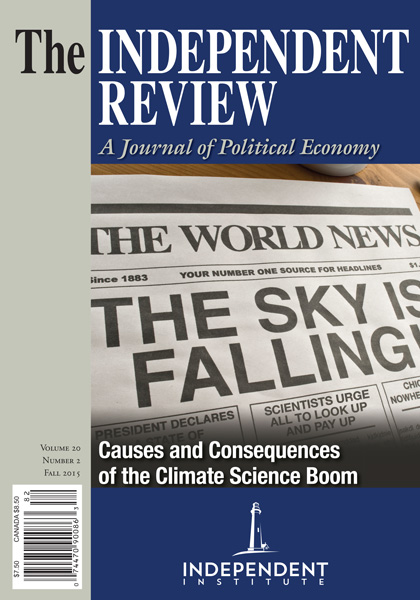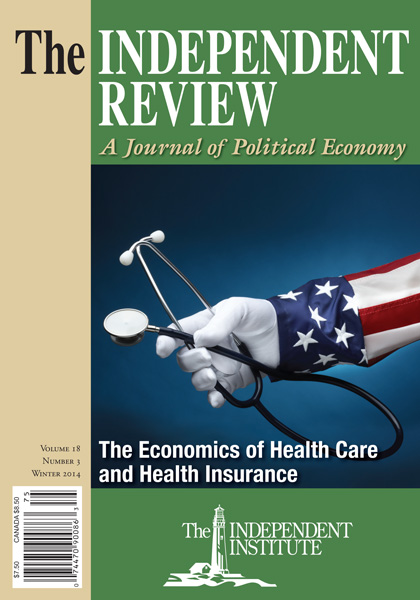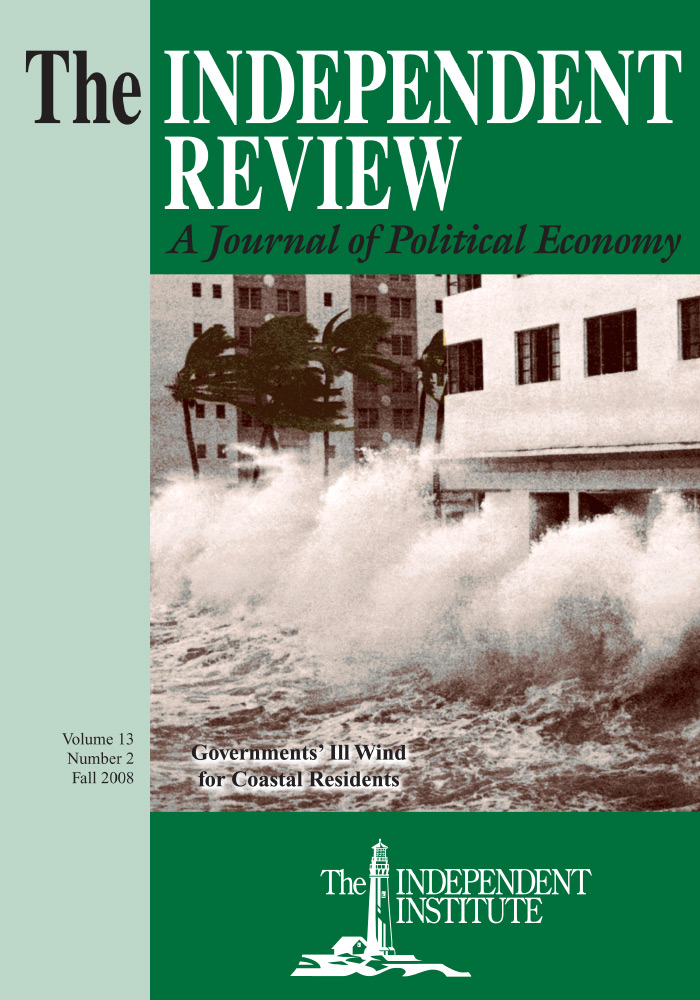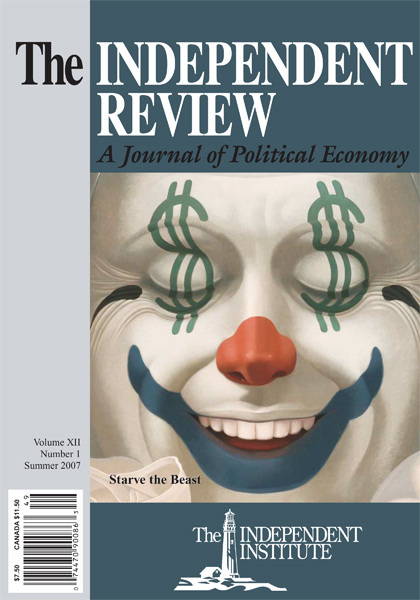In breaking bread with Robert Nozick, philosopher Dave Schmidtz discovered a kinship with a conversation partner whose philosophical prowess was eclipsed only by his desire to learn. Nozick cared more about helping others navigate the complex truths of human life than converting them to the views of yet another fallible (though brilliant) human being.
Article
Robert Nozick and his Harvard colleague John Rawls were giants of twentiethcentury political philosophy. While no one comes close to Rawls in terms of citations or influence, no one comes closer than Nozick. Nozick said, “Political philosophers now must either work within Rawls’s theory or explain why not” (1974, 183). There is truth in the compliment, but when it came to explaining why not, no one did more than Nozick.
Nozick was curious about everything. The range of his contributions is shocking: epistemology, personal identity, free will, decision theory, quantum theory (?!), and more. Yet what made him notorious was his book Anarchy, State, and Utopia. Anarchy, State, and Utopia is substantially a response to Rawls, although it ranges over many topics.
The experience machine, discussed in part 1, engagingly articulates Nozick’s discomfort with utilitarianism. In a less obvious way, it may also express Nozick’s worry about Rawls’s way of modeling separate personhood. That is, Rawls’s departure from utilitarianism depicts bargainers as separate consumers, entitled to separate shares, leaving another key aspect of personhood where Rawls departs not at all from utilitarianism. That is, Rawls is as keen as any utilitarian to deny the separateness of what people do and thus to dismiss their prior agency as arbitrary when it comes to assessing their claim to the largest possible slice of the pie. Part 2 continues to pound on the incongruousness of exalting our separateness as consumers even while implicitly denigrating and even denying our separateness as producers. Part 3 argues that true utopia would not privilege any particular vision of utopia and would not seek to exclude incompatible rival visions. A true utopia would instead be a cooperative society for mutual advantage, the basic premise of which is that everyone comes to the table with a robust right to say no to unattractive offers.
It’s Just Dinner
I met Robert Nozick once. It was December 1999. I had been invited to Boston University to give the last talk of the millennium. The timing dictated that I had to treat the occasion as an opportunity to talk for the ages rather than on some inconsequential academic debate. So, the press release said I would speak on the meaning of life.
Robert Nozick sent me a note, saying he would attend but would come in only as I was being introduced and would sit at the back wearing a cap so that he would not attract undue attention. He said his presence had a way of being disruptive, and he did not want to disrupt my talk. Then he asked whether I would be in town long enough to have dinner with him, saying there was something he wanted to talk to me about. I said I was with my wife, Elizabeth Willott. Nozick said, please bring her as well.
I had known many people who had met Nozick. All had described Nozick with terms like “the smartest person they’d ever met.” So, I had a certain picture. I went to dinner expecting to meet the kind of person who needs you to know that he is the smartest person in the room. But he was nothing like that. Far from the kind of arrogance rooted in insecurity that I half expected, what struck me about Nozick was his kindness, quiet grace, and patience. He was a uniquely attentive listener. Incredibly, he had looked up Elizabeth’s work in insect biochemistry and had read a couple of her papers. Not only was he curious; he had cutting-edge questions about her work. What blew me away was that he was not showing off. He was not trying to prove anything. He was simply curious and wanted to grab the chance to learn about insect biochemistry (and to make my wife feel visible and welcome). The conversation was not about him at all. Nozick was a giant, but what he wanted us to know was not that he was a giant, but that he was human.
Then he turned to me. We revisited my presentation, not in a challenging way but simply to trade information about mutual interests. Then he said,
“I want you to know that the news of my departure from libertarianism has been greatly exaggerated.”
I responded,
“You don’t have to prove anything to me. Philosophy isn’t a team sport for me, so I don’t put weight on ‘isms’ of any kind. But for what it’s worth, it was you who announced your departure, so if anyone exaggerated said departure, it must have been you.”
Nozick wanted to explain. He said he had been working on symbolic rationality. He once had a view, or perhaps just a rhetorical question, about why a libertarian wouldn’t respect freedom even to a point of letting people sell themselves into slavery if that was their best option. Who would have a right to take that decision out of a person’s hands? Nozick said he never had a conviction that the logic of libertarianism went that far, but he could not see why not, so he left it as a rhetorical question.
A few years later, though, when he was studying symbolic rationality, Nozick came to realize that how to respect freedom is one question and how to stand for freedom is another. Morally, letting people sell themselves into slavery is like letting people commit suicide, but it is utterly different as a political statement. He concluded that, even if letting people sell themselves into slavery is a way of respecting their freedom, it cannot be a way of standing for freedom. The only way a nation can stand for freedom is to judge that a slavery contract would be unconscionable and, thus, unenforceable.
Nozick said that when he initially gestured at that idea of having given up on “the libertarianism of his youth,” he was unclear, and his vague concessions to political reality were misinterpreted. He said colleagues who had not spoken to him in years were suddenly friendly, respectful, and sympathetic. Some found it interesting that Nozick had just won a lawsuit against a former landlord who had charged Nozick rents in excess of what rent control laws allowed. Nozick said the lawsuit was about testosterone[1] and had nothing to do with philosophy, but some of his colleagues thought Nozick’s “defense” of rent controls had precipitated his rejection of libertarianism. Nozick said that he was tired of being vilified, tired of the protests, and that the change was nice even if based on a misinterpretation, so he didn’t correct the record and did not insist on going back to being vilified.
I told Nozick that I would not forget what he had said, that I had some inkling of the choices yet to come in my own career, that I’d never defend libertarianism or any “ism” besides realism, but that I’d never defend rent controls either.
The evening ended, we parted, and I never saw Nozick again. He did not tell me, but his stomach cancer had returned, and he was making peace with the world and living his remaining months as joyfully as he could. He was leaving traces.[2]
Traces
Nozick did not want his career to be a series of footnotes to Anarchy, State, and Utopia. Indeed, he mocked the idea, saying he had no interest in writing “Return of ASU” or “Son of ASU.” Yet, his final book, Invariances, did revisit themes from his first. His way of coming back to reflect, decades later, was subtle, unannounced, and largely unnoticed. But he had come back on his own terms, and he was selfconsciously wrapping up at a time when he no longer cared about resisting the momentum of his first book.
Nozick had also been keen to prevent his students from being swept along by that momentum. Some mentors crave disciples. Others want to leave traces. The difference in the styles of Rawls and Nozick was momentous. Rawls cultivated apostles. Nozick did not. Nozick had no interest in becoming a religion. He was like a father whose ambition for his children was that his children think for themselves. (Nozick had several famous students, but nothing in their work other than their sheer originality would ever lead you to guess they were his.) In his mentoring style, Nozick went beyond standing for freedom. He walked the talk.
In assessing Anarchy, State, and Utopia, we would do well to understand that the book’s purpose was to provoke rather than to prove. Nozick had premises. He had arguments. But to me, the book’s main influence stems from the seemingly casual examples he offered along the way. The Wilt Chamberlain story changed how egalitarians approach their subject. Egalitarians now see that an equality worth wanting has to focus on how people are treated over time, not on whether people have equal shares at any frozen moment. The utility monster made utilitarians scramble. The experience machine had an even more profound impact on how utilitarians approach their subject. It should have changed how Rawlsians approach theirs, too. As mentioned above, treating us in our separateness as consumers of slices of a pie as the heart of distributive justice overlooks our more fundamental separateness as producers. Being a person is not only about consumption but also about getting things done and deserving credit for what we do. What I have called the “big bang” theory of dessert assumes that justice is a question of how to slice the pie. That assumption is a catastrophic mistake. Theorists imagine they are seeing a pie and never dream of asking what makes it theirs to slice, oblivious to how antithetical their presumption is to the separateness of persons. (Yet it was Nozick who was said to lack foundations.) Nozick gave us something to think about more than he gave us a theory per se. But at some level Nozick understood that justice in the
real world is a matter of respecting what bakers bring to the table and not treating what they bring as ours to slice.
Nozick’s questions about mixing our labor with the ocean by pouring a can of tomato juice into it was his gentle, funny, but telling way of challenging Lockean understandings (including his own!) of processes that legitimize institutions of property. A series of skeptics about private property’s justification would crow for twenty years that Nozick had unwittingly refuted libertarianism until the conversation ended in 1994.[3]
In any case, Nozick was underrated as a realist. He saw how nuances of realworld communities could problematize whatever absolutist theory of rights he might otherwise have found tempting. The last waterhole was another such case, as was his worry about an unscrupulous enemy using innocent shields. Other questions about the whole idea of distributive justice rang so true that readers could only laugh. What are the principles governing the fair distribution of mates? Finding a mate is a central drama at the heart of the human condition, so if it falls outside the purview of fair distribution, why assume anything falls inside? We would not assign grades by distributing the highest grade to the least advantaged student (not in Nozick’s day, anyway). So if grades are to be distributed, and fairly, and if distributing grades fairly is basic to the structure of the world we know best, why doesn’t the Difference Principle apply?
Such examples were arguably the most lasting traces left by Anarchy, State, and Utopia. They were never going to come together to be a bible, or even a full-blown theory; they were never going to be the seeds from which a cult would grow. They were food for thought.
We do philosophy differently today. I suspect it has something to do with Nozick. Our former “take no prisoners” approach to departmental colloquia gave way to something more thoughtful, where we understand that there is room for words other than final words. For a time, it was the rule rather than the exception that speakers would start talks with a self-deprecating remark about how their argument was so powerful that listeners would have to either agree with it or have a brain hemorrhage. Everyone understood the implicit salute to Nozick. In terms of seeing the limits of what we can expect from philosophical argument, Nozick was ahead of his time.
I have no idea what I ate that evening as an era was ending, but it was the most memorable dinner I’ve ever had.
Notes
[1] The backstory: When Nozick confronted his landlord, Eric Segal, about the illegality of Segal’s rent increases, Segal responded by waving his copy of Anarchy, State, and Utopia in Nozick’s face and declaring that Nozick had waived his right to complain. Nozick replied that he had done nothing of the kind; if Nozick had, Nozick would have been the first to know. Segal said, so sue me. So Nozick sued him.
[2] I later published “The Meanings of Life.” I mentioned Nozick’s observation that “a significant life is, in some sense, permanent; it makes a permanent difference to the world—it leaves traces” (Nozick 1981, 582). My response:
I wonder. Why must the traces we leave be permanent? More generally, is it possible to try too hard to leave traces? One thing you notice about philosophers, at least the productive ones, is that hunger for leaving traces. It must be a good thing, that hunger. It makes people productive, and in producing, they leave traces. And yet, the hunger is insatiable so far as I can tell. No amount of attention is enough. We all know the kind of person—many of us are the kind of person—who gets upset because our reputations do not match Robert Nozick’s. The few who attain that stature immediately proceed to get upset about Bertrand Russell. And so just as surely as there is something good about the hunger to leave traces, there is something bad too. Even as that hunger fuels our effort to leave traces, it leaves us unsatisfied with the (impermanent) traces we actually leave. (Schmidtz 2001, 178)
[3] By 1994, over a dozen authors on the Lockean proviso had claimed that any appropriation leaves less for latecomers as a matter of logical necessity. So, I asked, if first-comers necessarily leave less for latecomers, why do latecomers have more than first appropriators do? First appropriation launches a community’s process of wealth creation, but what communities need to see being left for latecomers are opportunities to acquire wealth, not opportunities to be wealth’s first appropriator. That seemed to end the discussion (Schmidtz 1994). See also Sanders (1987).
References
Nozick, Robert. 1974. Anarchy, State, and Utopia. New York: Basic Books.
———. 1981. Philosophical Explanations. Cambridge, Mass.: Belknap Press.
Sanders, John T. 1987. Justice and the Initial Acquisition of Private Property. Harvard Journal of Law and Public Policy 10:367–99.
Schmidtz, David. 1994. The Institution of Property. Social Philosophy & Policy 11:42–62.
———. 2001. The Meanings of Life. In If I Should Die, edited by Leroy Rouner, 170–88. Notre Dame, Ind.: Notre Dame University Press.

